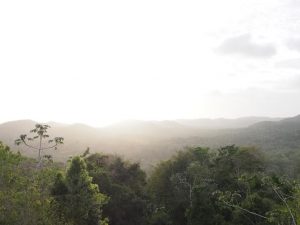Sitting on the station’s porch, I was able to see a crested guan (Penelope purpurascens), a relative of a turkey, perched in a tree. Only the bird’s silhouette was seeable to the naked eye; a spotting scope was needed to see the fire-red jowl and dynamic white and dark spotted pattern on the breast.
My class and I explored the two outermost chambers of Las Cuevas cave. The opening of the cave was enormous, taking up my entire field of vision. The front chamber was decorated with mud and guano from the bats in the ceiling. Light filled the front of the chamber but weakened in a gradient to the back of the chamber. The second chamber was almost completely dark.
Leaving the cave, we encountered an unidentifiable species of snake slithering up about six feet of the cave’s wall and then concealing itself behind a crag. Having such a clear view of the snake and watching it engage in such uncommon behavior was certainly a sight to see.
We later embarked on a hike to Las Cuevas’ bird tower. On the trail, we passed a Brazilian fern tree (Schizolobium parahyba) covered in moss and growing sideways across the path. The higher the elevation we hiked, the more Trumpet trees (Cecropia obtusifolia) we encountered. Trumpet tree leaves were not very dense, but took up quite a bit of space due to their high-surface-area design. The trees shed some of these leaves, which shriveled into gray bundles on the ground.
Upon reaching the top of a large hill, we climbed to the top of the bird tower to be rewarded with an unparalleled view of the forest. From this elevated vantage point, you could see rolling hills abundant with green, gently integrating into the mist in the distance. The sky was a sharp shade of blue, and the color grew sharper and warmer as the sun set. The clouds were backlit, appearing a warm golden color. Time passed, and the sky grew warmer and warmer but then effortless transitioned to a cool indigo when the sun hid behind the horizon.

We walked back from the sight in the dark of night. Only the contents of glowing projections from our headlamps were visible. The views were restricted but still allowed us to encounter the scorpions, spiders, crickets, and cockroaches that emerge only in the darkness.
From the magnified view from the spotting scope to the partially-illuminated view within the cave to the all-seeing view from the bird tower to the insular view of the headlamp’s contents, today’s views were as diverse as the rainforest’s wildlife itself. Diversifying not only what I see but also how I see it has allowed me to gain appreciation for the rich content of the rainforest, at all different scales.
I feel much closer to seeing the whole picture.
